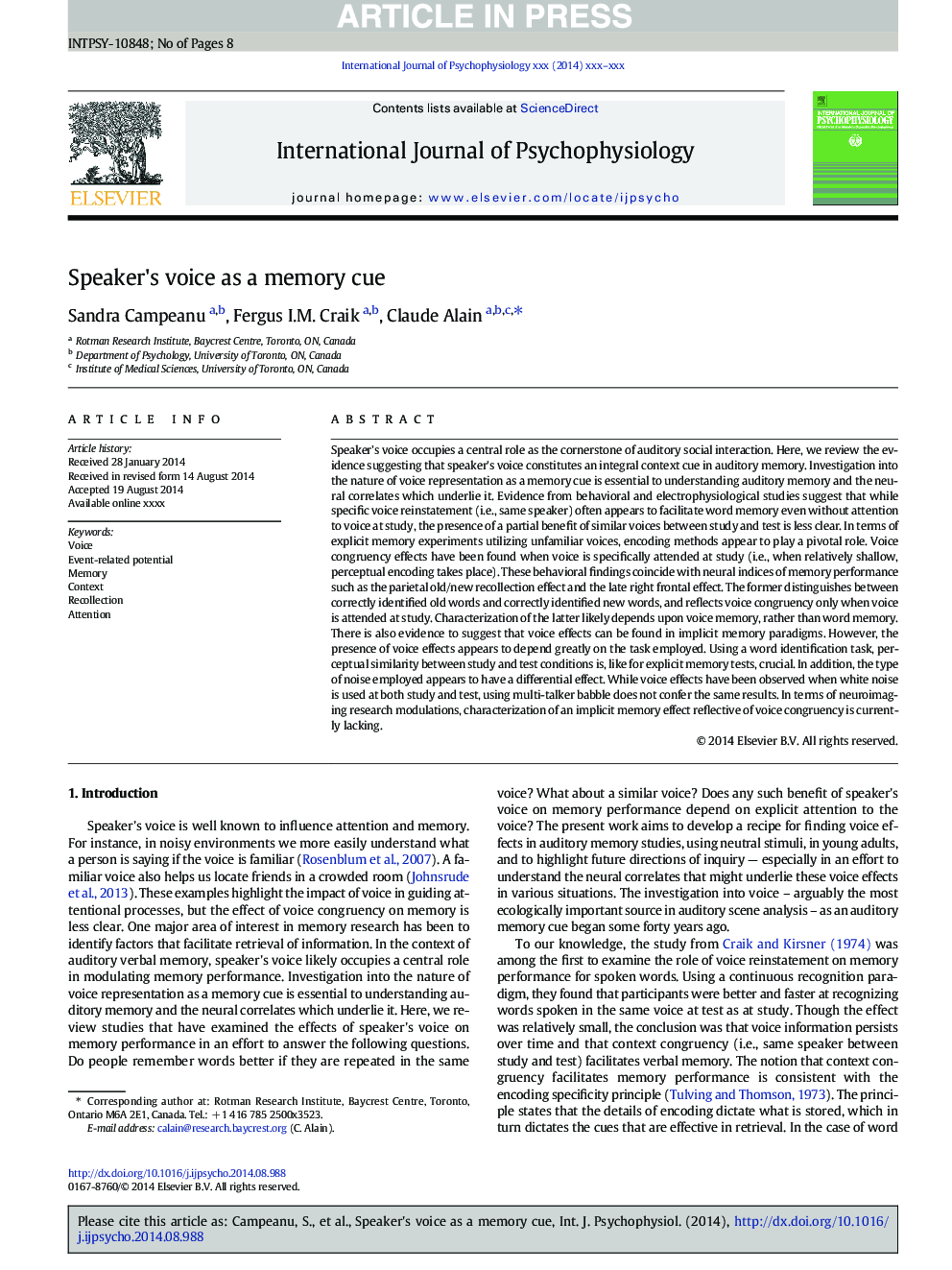| کد مقاله | کد نشریه | سال انتشار | مقاله انگلیسی | نسخه تمام متن |
|---|---|---|---|---|
| 7295601 | 1474410 | 2015 | 8 صفحه PDF | دانلود رایگان |
عنوان انگلیسی مقاله ISI
Speaker's voice as a memory cue
ترجمه فارسی عنوان
صدای بلندگو به عنوان یک نشانه حافظه
دانلود مقاله + سفارش ترجمه
دانلود مقاله ISI انگلیسی
رایگان برای ایرانیان
کلمات کلیدی
صدای پتانسیل مربوط به رویداد، حافظه، متن نوشته، یادآوری، توجه
ترجمه چکیده
صدای بلندگو نقش اصلی را به عنوان پایه ای از تعاملات شنوایی اجتماعی ایفا می کند. در اینجا، شواهدی را ارائه می دهیم که بیان می کند صدای سخنران یک قاعده انتگرال در حافظه شنوایی است. بررسی ماهیت نمایندگی صدا به عنوان یک نشانه حافظه برای درک حافظه شنوایی و همبستگی های عصبی که اساس آن است، ضروری است. شواهد حاصل از مطالعات رفتاری و الکتروفیزیولوژیک نشان می دهد که در حالی که بازسازی خاص صدا (یعنی همان بلندگو) اغلب به نظر می رسد حافظه کلمه را حتی بدون توجه به صدا در مطالعه تسهیل کند، حضور یک مزیت جزئی از صدای مشابه بین مطالعه و آزمون کمتر روشن است. با توجه به تجربه های حافظه صریح با استفاده از صداهای ناآشنا، روش های رمزگذاری نقش مهمی ایفا می کنند. جلوه های صوتی همگرا در زمانی که صدا به طور خاص در مطالعه مورد توجه قرار می گیرد (به عنوان مثال، زمانی که نسبتا جزئی، رمزگذاری ادراکی اتفاق می افتد) یافت می شود. این یافته های رفتاری با شاخص های عصبی عملکرد حافظه مانند اثرات احیا قدیمی / جدید و اثر جلوی چشم راست راست همخوانی دارد. سابق متمایز می شود بین کلمات صحیح شناسایی قدیمی و کلمات جدید به درستی شناسایی شده است، و نشان می دهد هماهنگی صدا تنها زمانی که صدا در مطالعه حضور داشته باشد. خصوصیات دومی احتمالا به جای حافظه کلمه بستگی به حافظه صوتی دارد. همچنین شواهدی وجود دارد که نشان می دهد که اثرات صدا در پارادایم های حافظه ضمنی وجود دارد. با این حال، حضور جلوه های صوتی به نظر می رسد تا حد زیادی بر روی وظیفه مورد استفاده بستگی دارد. با استفاده از یک وظیفه شناسایی کلمه، شباهت ادراکی بین مطالعه و شرایط آزمایش، مانند آزمون های صوتی صریح، بسیار مهم است. علاوه بر این، نوع سر و صدا به نظر می رسد اثر متفاوتی داشته باشد. در حالی که جلوه های صوتی در زمانی که سر و صدای سفید در هر دو مطالعه و آزمون مورد استفاده قرار می گیرد، مشاهده شده است، استفاده از صدای چند سخن گوینده نتایج مشابهی ندارد. از لحاظ نظارت بر تحولات نورولوژیکی تحقیق، مشخص کردن یک اثر حافظه ضمنی نشان دهنده همگرایی صدا در حال حاضر فاقد آن است.
موضوعات مرتبط
علوم زیستی و بیوفناوری
علم عصب شناسی
علوم اعصاب رفتاری
چکیده انگلیسی
Speaker's voice occupies a central role as the cornerstone of auditory social interaction. Here, we review the evidence suggesting that speaker's voice constitutes an integral context cue in auditory memory. Investigation into the nature of voice representation as a memory cue is essential to understanding auditory memory and the neural correlates which underlie it. Evidence from behavioral and electrophysiological studies suggest that while specific voice reinstatement (i.e., same speaker) often appears to facilitate word memory even without attention to voice at study, the presence of a partial benefit of similar voices between study and test is less clear. In terms of explicit memory experiments utilizing unfamiliar voices, encoding methods appear to play a pivotal role. Voice congruency effects have been found when voice is specifically attended at study (i.e., when relatively shallow, perceptual encoding takes place). These behavioral findings coincide with neural indices of memory performance such as the parietal old/new recollection effect and the late right frontal effect. The former distinguishes between correctly identified old words and correctly identified new words, and reflects voice congruency only when voice is attended at study. Characterization of the latter likely depends upon voice memory, rather than word memory. There is also evidence to suggest that voice effects can be found in implicit memory paradigms. However, the presence of voice effects appears to depend greatly on the task employed. Using a word identification task, perceptual similarity between study and test conditions is, like for explicit memory tests, crucial. In addition, the type of noise employed appears to have a differential effect. While voice effects have been observed when white noise is used at both study and test, using multi-talker babble does not confer the same results. In terms of neuroimaging research modulations, characterization of an implicit memory effect reflective of voice congruency is currently lacking.
ناشر
Database: Elsevier - ScienceDirect (ساینس دایرکت)
Journal: International Journal of Psychophysiology - Volume 95, Issue 2, February 2015, Pages 167-174
Journal: International Journal of Psychophysiology - Volume 95, Issue 2, February 2015, Pages 167-174
نویسندگان
Sandra Campeanu, Fergus I.M. Craik, Claude Alain,
